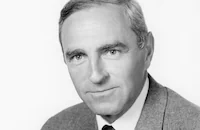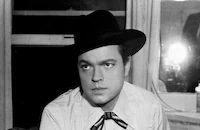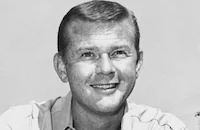Compulsion

Brief Synopsis
Cast & Crew
Richard Fleischer
Orson Welles
Diane Varsi
Dean Stockwell
Bradford Dillman
E. G. Marshall
Film Details
Technical Specs

Synopsis
In 1924, Judd Steiner and Artie Straus, two young University of Chicago law school geniuses from socially prominent families, steal a typewriter from a campus fraternity house and then drink to the execution of the perfect crime, which they consider a true test of their superior intellect. In their jubilation, they nearly run over a drunk, and when the man yells at them, the domineering, sadistic Artie orders Judd to turn around and run him down, but Judd swerves at the last minute, allowing the drunk to jump out of the speeding car's path. The next day in class, Artie challenges his professor's conception of justice, and instead advocates the Nietzschean idea of a superman detached from all human emotions. After class, Sid Brooks, one of the poorer students who works as a reporter to pay for his education, goes to the newspaper office and is assigned to cover a story about a drowned boy found in the park. Once the medical examiner pronounces that the boy was killed by a blunt instrument, Sid matches the victim's description to that of the unsolved kidnapping of Paulie Kessler and notifies Tom Daly, the reporter covering the kidnap story. A pair of glasses were found near the body, and when Paulie's uncle states that his nephew never wore glasses, Sid realizes that they must belong to the murderer. Afterward, Sid joins his girl friend, Ruth Evans, Artie, Judd and a few other students at a nightclub, and after he reveals that a pair of glasses were found near the body, Judd discovers that his own glasses are missing. Upon returning home, Judd frantically searches for his spectacles as he and Artie blame each other for their loss. The boys then concoct an alibi in which Judd will say he dropped his glasses while bird watching in the park and that on the night of the murder, they were cruising for girls in Judd's Stutz Bearcat. The next day, the police are questioning potential witnesses at Paulie's school when Artie intrudes and volunteers his help as a former student. Lt. Johnson then inquires if there were any odd teachers at the school, and Artie relishes impugning the reputation of several of his old instructors. Later, Ruth meets Judd at a diner and is intrigued when the introverted boy invites her to go bird watching with him. Artie, meanwhile, delights in phoning in false leads about the murder and pumps Sid for news about the case. When Sid mentions that the typewriter on which the ransom note was written has been identified, Artie, who had been avoiding Judd's calls, hurries to the Steiner house, where he berates Judd for failing to dispose of the typewriter. After Artie learns that Judd has a date with Ruth to go bird watching, the diabolic Artie orders Judd to rape her, thus "exploring all the possibilities of human experience." Later, while in the park with Ruth, Judd begins ranting about beauty in evil and then tries to sexually assault her. When Ruth responds not with fear but compassion, Judd breaks down in tears of shame. Soon after, the police come to question Judd about the glasses found at the murder scene and escort him to see State's Attorney Harold Horn. After Horn informs Judd that the glasses have been identified as his because of their unusual hinges, he interrogates the boy throughout the rest of the afternoon until Judd finally recounts his alibi. Summoned to Horn's hotel suite, Artie asserts that he was at the movies alone that night, thus undercutting Judd's alibi. Artie then cleverly recants his story and admits that he was with Judd, thus convincing Horn of their veracity. Horn is about to release the boys when the Steiner's chauffeur inadvertently mentions that the Stutz was out of commission on the day of the murder. Determined to get the truth, Horn tricks Judd into confessing by claiming that Artie named him as Paulie's killer. Crazed by betrayal, Artie blurts out that Judd is the real murderer. After each of the boys accuses the other of murder, famed attorney Jonathan Wilk is hired by their families to defend them. The state's doctors have decreed that the boys are sane, thus depriving Wilk of an insanity plea. When Horn argues that the death penalty can be the only just verdict, Wilk, realizing that he has no chance of a jury acquittal, unexpectedly enters a plea of guilty with unmitigating circumstances, thus avoiding a jury trial and putting the verdict in the judge's hands. After the psychiatrists testify that Judd is paranoid and Artie schizophrenic, Wilk calls Ruth to the stand, and when Ruth voices her empathy for Judd, Judd passes out in the courtroom. In his lengthy summation, Wilk appeals to the judge's conscience and regard for human life. In an emotional plea, Wilk argues that cruelty only begets cruelty and that mercy is the highest attribute of man. After careful consideration, the judge sentences Judd and Artie to life in prison, but Artie remains bitter and unrepentant.

Director

Richard Fleischer
Cast

Orson Welles
Diane Varsi

Dean Stockwell
Bradford Dillman

E. G. Marshall

Martin Milner

Richard Anderson
Robert Simon

Edward Binns

Robert Burton
Wilton Graff
Louise Lorimer
Gavin Mcleod
Terry Becker
Russ Bender
Gerry Lock
Harry Carter
Simon Scott
Voltaire Perkins
Crew
Eli Benneche
Eugene Grossman
Earle Hagen
Ben Kadish
Mark-lee Kirk
Charles Lemaire
Harry M. Leonard
William C. Mellor
Richard Murphy
Lionel Newman
Ben Nye
Adele Palmer
William Reynolds
Walter M. Scott
Helen Turpin
Lyle R. Wheeler
Darryl F. Zanuck
Richard D. Zanuck

Film Details
Technical Specs

Articles
Compulsion
Although in the movie the two boys are called Judd Steiner and Arthur Strauss, and Darrow's name was changed to Jonathan Wilk, Leopold sued for invasion of privacy. The case was dismissed eleven years later, in part because Leopold had already published his own autobiography detailing the same facts.
Richard Zanuck, son of Fox studio boss Darryl F. Zanuck, got his first break as producer with this picture. He and director Richard Fleischer, working from the novel by Meyer Levin, turned out a stylish piece that garnered mostly positive reviews, modest box office, and several important award nominations. It also won a joint Best Actor award at the Cannes Film Festival for the three male leads: Orson Welles as Wilk/Darrow, Bradford Dillman as Strauss/Loeb, and the most inspired casting of all, former angelic child star Dean Stockwell as Steiner/Leopold. In her capsule review of the film for The New Yorker, Pauline Kael said Welles "as a spokesman for humanity and humility" is "a terrible humbug" but that Stockwell gave the film's one truly remarkable performance.
Stockwell came to the screen role having already created his character for the stage, opposite Roddy McDowall as Strauss, in the problem-plagued Broadway production written by Levin from his own book. Fox had purchased the "documentary novel" in December 1956 with the stipulation that the author turn it into a stage play by the following December. Levin wanted to wait for Welles to play the lawyer on stage, but the actor was embroiled in ongoing financial problems at the time, so Frank Conroy was cast. Before the play even opened, it was getting a lot of negative press over a lawsuit between Levin and the Broadway producers. Stockwell got a severe case of the flu during previews, and Conroy suffered a heart attack and had to be replaced. When the play opened in October 1957, it got mixed reviews, and it closed the following February.
Stockwell and Bradford Dillman met the day they were to shoot their first scene together, and Dillman found his co-star aloof at first, which he attributed to Stockwell's disgruntlement that his friend Roddy McDowall had not been cast in the screen version. Right before they were to shoot a scene in which the two characters go at each other during an interview with the district attorney, Dillman said Stockwell laid into him with "the longest litany of vilification that you could possibly imagine." After shooting the scene, Stockwell apologized for his behavior, explaining he needed to "stoke his fires" before shooting the intense scene. The two got on well after that.
The real problem actor was Orson Welles, who clashed frequently with Fleischer and everyone else on the set, exhibiting behavior Stockwell described as sadistic. Furthermore, Welles' tax situation prevented him from spending more than a set amount of time in the U.S. Before shooting was complete, he left the country without finishing the voiceover recording of his character's climactic twelve-minute summation speech, forcing the sound editor to piece together words, phrases, and sounds uttered by Welles during the shoot, even grabbing some dialogue from other films in which Welles had acted.
About that speech: Although reportedly one of the longest monologues in film history, the closing arguments actually took up just a fraction of the time spent by Darrow (two days) in the real-life trial.
The stage version had a modern-day sequence showing some of the characters thirty years after the story takes place. This was not used in the film.
The film was a good boost for Stockwell as an adult actor. In addition to many television appearances following this, his next two films were prestige productions: Jack Cardiff's D.H. Lawrence adaptation Sons and Lovers (1960) and Sidney Lumet's film version of Eugene O'Neill's play Long Day's Journey Into Night (1962), in which the young actor held his own with such heavyweights as Katharine Hepburn, Ralph Richardson, and Jason Robards, once again earning a joint Best Actor award at Cannes with his two male co-stars.
The Leopold and Loeb case provided the material for two other films, Alfred Hitchcock's thriller Rope (1948), which played on Leopold's attraction to the philosophy of Nietzsche, and Tom Kalin's independent feature Swoon (1992).
Director: Richard Fleischer
Producer: Richard D. Zanuck
Screenplay: Richard Murphy, based on the book Compulsion and Free Will and the play by Meyer Levin
Cinematography: William C. Mellor
Editing: William Reynolds
Art Direction: Mark-Lee Kirk, Lyle R. Wheeler
Music: Lionel Newman
Cast: Orson Welles (Jonathan Wilk), Dean Stockwell (Judd Steiner), Bradford Dillman (Arthur Strauss), Diane Varsi (Ruth Evans), E.G. Marshall (District Attorney Harold Horn), Martin Milner (Sid Brooks).
BW-103m.
by Rob Nixon

Compulsion
Quotes
Trivia
The closing arguments monologue was the longest in film history.
Although the story was obviously a thinly-disguised recreation of the Nathaniel Leopold and Richard Loeb murder case, the legal department of 20th Century Fox was still concerned about a possible lawsuit from the still-living Leopold. A great effort was made not to mention Leopold or Loeb in the movie, press releases, and interviews. However, there was apparently poor communication with the advertising department, since when the movie came out, newspaper ads stated, "Based on the famous Leopold and Loeb murder case." Leopold sued 20th Century Fox, and won.
Because Orson Welles was having tax problems during the production, at the end of shooting his salary for the movie was garnisheed by the L.A. Sheriff's department. This upset Welles so much that just before he finished looping his dialogue in post-production, he stormed off the studio and left the country. All that was left to be looped was the last twenty seconds of his end speech in the courtroom. Incredibly, editor 'Bill Reynolds' fixed this problem without needing Welles. Reynolds took words and pieces of words Welles had spoken earlier in the movie, and pieced them one by one into those twenty seconds.
Notes
Compulsion was based on the notorious 1924 case of Nathan Leopold (1904-1971) and Richard Loeb (1905-1936), who were eighteen-year-old law students at the University of Chicago when they killed fourteen-year-old Robert Franks for thrills. Renowned attorney Clarence Darrow defended them, and his closing argument lasted for two days. Several verbatim passages from Darrow's closing were included in the film. Leopold, on whom the character "Judd Steiner" was based, was freed on parole in 1958 after serving almost 34 years in prison. According to an October 1959 LA Mirror News article, in 1959, Leopold sued author Meyer Levin, Darryl F. Zanuck and Twentieth Century-Fox for $1,405,000 in damages, claiming that the film was an invasion of his privacy. According to an April 1968 Variety news item, Leopold won a summary judgment in 1964, but it was overturned in 1968 when the court ruled that the case was in the public domain. Leopold died of natural causes in 1971, but Loeb was killed in a prison knife fight in 1936.
Author Levin also wrote a play based on his novel which opened in New York on October 25, 1957. According to studio publicity contained in the film's production files at the AMPAS Library, Levin sold the literary rights to Zanuck under the proviso that Zanuck wait to produce the film until the play's Broadway run was completed. Zanuck turned the production reins over to his son Richard because he was busy working on Roots of Heaven (see below). Compulsion marked Richard Zanuck's first effort as a producer. Although a December 1958 Hollywood Reporter news item stated that Darryl Zanuck was to supervise the final editing, the extent of his contribution to the released film has not been determined.
Dean Stockwell reprised his Broadway role of "Judd Steiner" for the film. According to an April 1958 Hollywood Reporter news item, Roddy McDowall was originally slated to play "Artie." According to studio publicity, director Richard Fleischer tried to create an impression that something was wrong or out of balance in the scenes in which the two murderers appeared by tilting the camera or throwing the composition off balance. After completing the film, Diane Varsi abruptly left Hollywood to retire in Vermont. Varsi did not appear onscreen again until 1967. A modern source adds that Welles, Dillman and Stockwell shared the Best Actor award at Cannes. Voltaire Perkins, who played the judge in the film, was a practicing attorney as well as an actor. He was best known for his role as the presiding judge on Divorce Court, the popular, long-running, daytime television program that began in the late 1950s.
Several other films have used the Leopold-Loeb case for inspiration: the 1948 Warner Bros. production Rope, directed by Alfred Hitchock and starring Dick Hogan and John Dall (see AFI Catalog of Feature Films, 1941-50); the 1992 Alta Films release Swoon, directed by Tom Kalin and starring Craig Chester; and the 2002 Warner Bros. release Murder By Numbers, directed by Barbet Schroeder and starring Sandra Bullock and Ben Chaplin.

Miscellaneous Notes
Winner of the Best Actor Award for Ensemble Male Performances (Stockwell, Dillman, and Welles) at the 1959 Cannes Film Festival.
Released in United States Winter January 1, 1959
Released in United States on Video September 6, 1995
Released in United States 1998
Shown at Los Angeles County Museum of Art (LACMA) as part of program "Twentieth Century Fox and the Golden Age of CinemaScope" July 3 - August 15, 1998.
Film is based on the Leopold and Loeb murder case of 1924 in Chicago.
CinemaScope
Released in United States Winter January 1, 1959
Released in United States on Video September 6, 1995
Released in United States 1998 (Shown at Los Angeles County Museum of Art (LACMA) as part of program "Twentieth Century Fox and the Golden Age of CinemaScope" July 3 - August 15, 1998.)














